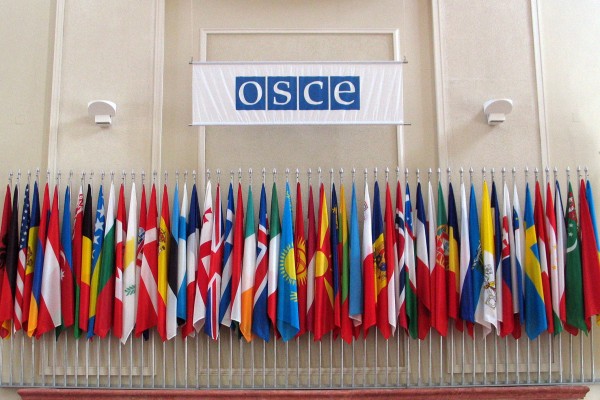Supplementary Human Dimension Meeting: OSCE Emphasizes Importance of Key Principles of Democracy
The Organization for Security and Co-operation in Europe is organizing the Supplementary Human Dimension Meeting, emphasizing the importance of democratic principles, human rights and independent media work and how the Russian invasion of Ukraine is threatening these principles in Europe.
 The Organization for Security and Co-operation in Europe is emphasizing the importance of democratic principles, human rights and independent media work. / Picture: © OSCE / Mikhail Evstafiev (CC BY-ND 4.0)
The Organization for Security and Co-operation in Europe is emphasizing the importance of democratic principles, human rights and independent media work. / Picture: © OSCE / Mikhail Evstafiev (CC BY-ND 4.0)
The Organization for Security and Co-operation in Europe held its second Supplementary Human Dimension Meeting of 2022, which provided a platform for an exchange of views on democratic institutions and the importance of their work to protect and promote the OSCE’s human dimension commitments in times of crisis.
The current crisis in Europe due to the Russian invasion of Ukraine is threatening important principles of democracy and human rights. The Kremlin is crossing lines and threatens democratic values in many countries of Europe.
“The unprovoked Russian aggression against Ukraine has shaken the foundations of international and European security order causing thousands of unnecessary deaths and suffering of the civilian population. The scale of egregious violation of international law, including humanitarian and human rights law is enormous. Against this background, we have proposed to discuss the role of fundamental freedoms, such as freedom of expression and of association, and the functioning of democratic institutions in the times of crisis.” , said Ambassador Artur Dmochowski, Special Envoy of the OSCE Chairman-in-Office opening the conference on behalf of the OSCE Chairman-in-Office, Polish Foreign Minister, Zbigniew Rau.
The OSCE's Supplementary Human Dimension Meetings (SHDM) provide a platform for participating States and OSCE institutions, as well as international organizations and civil society, to discuss the challenges facing societies in the OSCE region and explore possible solutions.
The focus of the discussion follows the first SHDM of the year on international cooperation to address violations of international humanitarian law and international human rights law. One more meeting is planned for 2022.
The SHDM is organized in three sessions, each focusing on certain aspects and key principles of democratic societies.
In the first session, participants discussed how democratic institutions from parliaments to local authorities can contribute to effective crisis prevention and response.
The second session addressed the right to form, join, and participate in public associations. In some OSCE countries, these democratic rights have been curtailed increasingly, limiting the work of associations and forcing them to close. This session stressed the necessity of civil society in responding to and resolving crises.
The third session will discuss the importance of independent, free and pluralistic media for democratic societies and their security. The fact that while access to reliable information and quality media is important at all times, it becomes crucial in times of crisis.
The Vienna meeting brought together around 275 participants from across the OSCE region to discuss the importance of democratic institutions and the right to form and join associations to protect and promote human rights during times of crisis.
Among the participants were OSCE states, international organizations, civil society, and the media. In addition, participants identified good practices and concrete recommendations for strengthening the local and central government, parliaments, independent media, and civil society, which has been recognized by all OSCE members as essential to conflict prevention and resolution.
Best practices are needed to strengthen efforts to ensure human rights.
The OSCE is emphasizing the role of civil society and wants to strengthen efforts in supporting this important role of defending freedom and democracy. In times of crisis, national and local institutions are at the forefront of protecting democracy, but they also find themselves under greater pressure during these times.
“Civic engagement is the biggest commitment any individual can make to our societies and one that should be treasured. But unfortunately, that is not always the case. On the contrary, we are seeing restrictions on freedom of expression, peaceful assembly, and access to information undermining the work of civil society and even exposing human rights defenders to intimidation and persecution. I’m therefore particularly looking forward to the recommendations that come out of today’s discussions and looking at how ODIHR can best assist OSCE countries in making them a reality.”, said ODIHR Director Matteo Mecacci.
An important topic is the value of independent and free media for democratic societies and their security, especially in the face of a clampdown on media freedom in many parts of the OSCE region. Even though reliable information and quality media are important at all times, they become even more crucial during a crisis.
“Independent, free and pluralistic media are an indispensable part of democratic societies, it is rightly considered as one of the key institutions in any democracy. Nowadays, we are facing an unprecedented regress in media freedom and a severe clampdown on independent reporting across the entire OSCE region. At the same time, professional journalism is relied on more than ever to provide fact-based information and unbiased reporting on evolving crisis situations. A vibrant media landscape and favorable conditions for independent reporting greatly contribute to more security. This is why we need more media freedom, not less.”, said OSCE Representative on Freedom of the Media Teresa Ribeiro.
The OSCE highlights the importance of Human rights and democratic principles must continue to be the foundation of societies across the OSCE region and stressed that the Russian Federation’s military attack on Ukraine is creating unprecedented challenges to democratic institutions across the region.



